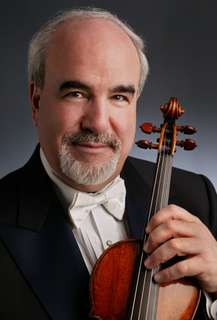|
Back
The Nobleman at Work New York
Avery Fisher Hall, Lincoln Center
12/10/2009 - & Dec. 11, 12, 2009
Wolfgang Amadeus Mozart: Sinfonia Concertante in E-flat major for Violin, Viola and Orchestra (K. 364/320d)
Anton Bruckner: Symphony No.4 in E-flat major (Romantic)
Glenn Dicterow (Violin), Cynthia Phelps (Viola)
New York Philharmonic Orchestra, Christoph von Dohnányi (Conductor)

G. Dicterow (© Chris Lee)
Mozart wrote music for the honor of noblemen, need for money, respect for soloists, devotion to his art and the glory of God. But after the Sinfonia Concertante last night, I had the feeling that Mozart looked at the completed score, clapped his hands, shook his head, and exclaimed, “Gee, this stuff is really good!”
Not that the Sinfonia Concertante isn’t more than “good.”. But the piece show such delight, from first measure to the cadenza to the unaffected second movement and the happy finale that it could only have been composed with joy, real joy. Possibly Mozart was recalling the days when he played duets with his sister. Possibly, since he was living at home and wrote it for himself, he was just doodling whatever divine thoughts came to his divine mind.
All string soloists essay the work (especially violists!), and professionals rarely go wrong. Glenn Dicterow and Cynthia Phelps seemed especially comfortable with the work, since–like Mozart–they were amiably at “home”. They have been First Chair players for the Phil a total of almost half a century (Mr. Dicterow 30 years, Ms. Phelps 18 years), and they obviously felt the comfort level which was projected to the audience.
As befitting such a personal work, the two soloists complemented rather than mirrored each other. Mr. Dicterow is the paragon of graceful, unaffected, technically consummate playing. Ms. Phelps was spikier, her bow was lighter, more bouncy. Mozart made certain that the two never imitated each other in the second movement, each playing slightly different canonic forms, and the two took turns in offering their graceful best. Mozart’s final Presto movement has too much material to take at breakneck speed, so conductor Christoph von Dohnányi took the pace at a gentle sprint, the ideal finish for a work which breathes such gentle spirit.
Conductor von Dohnányi is a hybrid conductor, the third generation of aristocratic Hungarian musicians and composers, classically schooled in the very centre of Central European music. After years as Music Director of the Cleveland Orchestra, he is equally at home with American orchestras. Yet his patrician bearing, his unostentatious conducting, his inner prowess (he needed no score) created the mood for a very staid Bruckner Fourth Symphony.
A mere three weeks ago, Dennis Russell Davies conducted almost the same work with the Bruckner Orchestra of Linz. It was a rousing, beautifully shaped work–except that Mr. Davies chose the rarely played original score written by Bruckner. That was an educational treat, but sadly inferior to this Robert Haas edition here. Mr. Dohnányi conducted the Concerto For Horn And Orchestra……er, sorry, the Fourth Symphony with more stately tempos, the great chorales organically easing up to the audience rather than being so pronounced in the Davies performance.
The latter was easier on the audience, which could let the mind wander during the “stuffing” and wait to be aroused. Mr. Dohnányi never allowed this to occur. The orchestra played throughout with a stately unified feeling, and First Horn Philip Myers, after a rather forced opening, played with his usual perfection. By the last chord, Christoph von Dohnányi had produced, without undue retardation, without exaggeration, a work of understated majesty.
Harry Rolnick
|